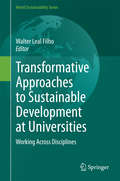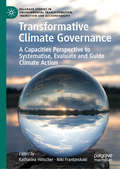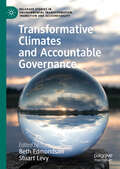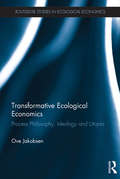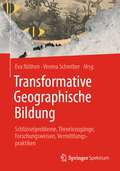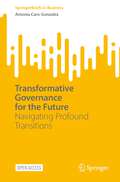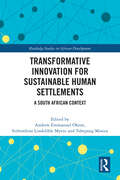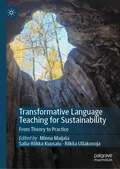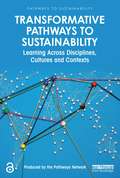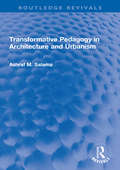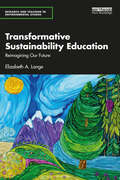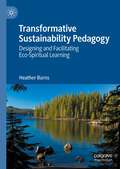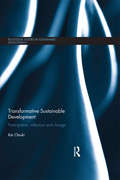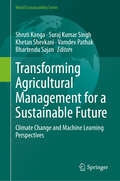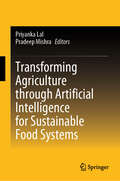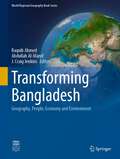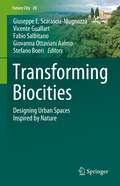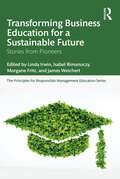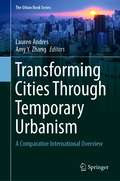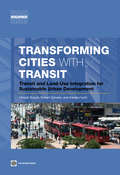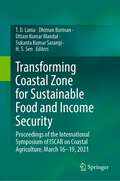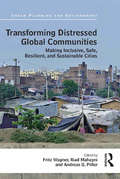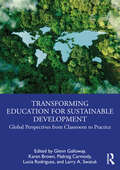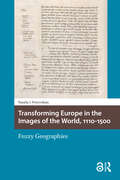- Table View
- List View
Transformative Approaches to Sustainable Development at Universities
by Walter Leal FilhoThis book documents and disseminates experiences from a wide range of universities, across the five continents, which showcase how the principles of sustainable development may be incorporated as part of university programmes, and present transformatory projects and programmes, showing how sustainability can be implemented across disciplines. Sustainability in a higher education context is a fast growing field. Thousands of universities across the world have signed declarations or have committed themselves to integrate the principles of sustainable development in their activities: teaching, research and extension, and many more will follow.
Transformative Climate Governance: A Capacities Perspective to Systematise, Evaluate and Guide Climate Action (Palgrave Studies in Environmental Transformation, Transition and Accountability)
by Niki Frantzeskaki Katharina HölscherHow to progress climate science to be policy-relevant and actionable? This book presents a novel framework to give a positive vision and structuring approach to guide research and practice on transformative climate governance, to shift the narrative from apathy and stalemate to action and transformation. Our vision contrasts existing climate governance and associated lock-ins that signify the institutional resistance to change. To effectively address climate change, climate governance itself needs to be transformed to foster sustainability transitions under climate change.The book brings together a collection of case studies to investigate how capacities for transformative climate governance are developing at multiple scales and how they can be strengthened vis-à-vis existing governance regimes. Specifically, it sheds light on the following questions: What are key overarching conditions, actors and activities that facilitate governance for transformation under climate change? Given persistent climate governance lock-ins, what needs to happen in research and policy to build-up the capacities that transform climate governance and ensure effective climate action?
Transformative Climates and Accountable Governance (Palgrave Studies in Environmental Transformation, Transition and Accountability)
by Beth Edmondson Stuart LevyThis book explores the real-world consequences changing ideas and strategies have on effective climate governance. Its main focus is on why accountability matters - both for transformations and transitions in international climate change governance and how international support for environmentally responsible actions, and extending shared accountabilities, might strengthen climate governance globally. A main point of discussion is if and how better understanding of accountabilities and transformations in ecosystems dynamics, the capacities of organisms to adapt, migrate or otherwise respond to environmental or climatic changes, can improve climate governance mechanisms. Bringing together a diverse set of considerations from various fields of study, chapters examine responses to environmental transformations that occur during periods of climatic crisis, such as species depletion, industrialisation, de-industrialisation or urbanisation. Throughout, this book aims to further readers understanding of if or how accountable climate governance can reduce the risks of global political disorder and widespread conflict in the 21st century, arising from environmental transformations of depleted forests, re-routed waterways, coastlines impacted by sea level rises, changed rainfall patterns and industrial practices.
Transformative Ecological Economics: Process Philosophy, Ideology and Utopia (Routledge Studies in Ecological Economics)
by Ove JakobsenWhen we look at the state of the world today, what is most evident is the fact that the major problems of our time – energy, environment, economy, climate change and social justice – cannot be understood in isolation. They are interconnected problems, which means that they require corresponding systemic solutions. Today’s global economy has brought about critical distress for ecosystems and societies and we have to go to the very root of the problems to find a way out. This volume develops a synthesized interpretation of ecological economics integrating different levels: (economic) system, (business) practice and the (economic) actor. It discusses how changes on a systems level are connected to changes in practice and development of individual consciousness. Transformative Ecological Economics delves into the insight and knowledge from different sources of inspiration (thermodynamics, Darwinism, anthroposophy and Buddhism) as well as into an integrated story describing and illustrating the core ideas, principles and values that characterize a utopian society anchored in ecological economics. Implementation of the deep changes demanded depends on our ability to write a new story, a utopian one for sure, but one which is in accordance with and based on the reality in which we live. This book will be of interest to those who study ecological economics, political economy and environmental economics.
Transformative Geographische Bildung: Schlüsselprobleme, Theoriezugänge, Forschungsweisen, Vermittlungspraktiken
by Eva Nöthen Verena SchreiberIn einer krisenhaften Zeit, in der globale Herausforderungen wie Klimawandel, Pandemien oder Migrationsbewegungen dazu verpflichten, unser Zusammenleben und unseren Umgang mit der Umwelt zu überdenken sowie eine Transformation aller Lebensbereiche auf den Weg zu bringen, ist eine emanzipatorische Bildung wichtiger denn je. Aus dem Bewusstsein um die Bedeutung von Bildung als tätige Auseinandersetzung mit einer beschädigten Welt ist in der Geographie die Idee einer transformativen geographischen Bildung erwachsen. Das vorliegende Werk verfolgt das Anliegen, transformativ‐emanzipatorische Zugänge zu geographischen Vermittlungspraktiken aus unterschiedlichen theoretischen Perspektiven zu erschließen. Es zeigt neue methodische Wege und Formen des Forschens und Unterrichtens für eine an den dringlichen Problemen der Gegenwart orientierte Geographiedidaktik auf.Konkret führt das Handbuch in Schlüsselprobleme der Gegenwart ein (u. a. Biodiversität, Gesundheit, Gewalt, Ressourcen, Ungleichheit) und erschließt gesellschaftstheoretische und bildungsphilosophische Perspektiven zu deren Reflexion (u. a. feministische, antirassistische und ästhetische Bildung, climate justice education). Die Schlüsselprobleme und Theoriezugänge aufgreifend, werden situierte Forschungsweisen vorgeschlagen (u. a. ethnographisch, kartierend, partizipativ und performativ forschen) und Vermittlungspraktiken für ein engagiertes Lehren und Lernen angeboten (u. a. critical science literacy, forschendes Lernen, kollaboratives Schreiben, story-mapping).Damit bringt das Buch erstmals die zahlreichen, auf eine transformative geographische Bildung zielenden Ansätze in einer Publikation zusammen und bildet so ein Grundlagenwerk für Studierende, Forschende und Lehrende der Geographie und ihrer Didaktik.
Transformative Governance for the Future: Navigating Profound Transitions (SpringerBriefs in Business)
by Antonia Caro-GonzalezThis open access book helps actors who are committed to change unlock true innovative potential for the common good in their organizations. Innovation and change processes are not linear. Hence, this book presents a novel way to manage complexity. The author introduces readers to a comprehensive change management framework, the Eoh-for-Good blueprint methodology. It presents the method and discusses how it can be used to support collaboration, overcome challenges and achieve lasting changes in organizations with a 360-degree approach combining top-down, middle-round and bottom-up collaborative perspectives.
Transformative Innovation for Sustainable Human Settlements: A South African Context (Routledge Studies in African Development)
by Andrew Emmanuel Okem Sithembiso Lindelihle Myeni Tshepang MosieaThis book uses the transformative innovation policy (TIP) as a lens to show how innovative processes, practices and systems could address critical challenges and facilitate the delivery of sustainable human settlements in South Africa.The TIP approach shows that addressing societal problems is not a function of a technical solution within a government department but one that requires partnership with multiple stakeholders. The book argues that it is essential to understand and embrace innovation policy that is transformative and responds to the social and environmental needs at local, provincial and national levels. It demonstrates that innovation policy should focus on transforming the socio-technical systems that demand embracing notions such as experimental delivery and learning, directionality and inclusivity. Chapters explore the ability of the state to transform its organisational processes and capacity to improve and align its planning, implementation, monitoring and evaluation systems to high levels of efficiency and sustainability targets.Bringing together various theoretical and empirical perspectives on innovation in the context of sustainable human settlement, this book will be of interest to scholars and students in the fields of Housing, Human Settlements, Architecture, Public Policy, Development Studies, Civil Engineering, Political Science and Public Administration.
Transformative Language Teaching for Sustainability: From Theory to Practice
by Riikka Ullakonoja Minna Maijala Salla-Riikka KuusaluThis edited book is centred around the novel didactic model of Transformative Language Teaching for Sustainability. The contributing authors discuss the uses and possibilities of the model, as well as other sustainability-related aspects of language education, such as Education for Sustainable Development, transformative language teaching methods, and ecolinguistics. The book consists of a combination of theoretical review articles and practical research articles drawing on findings from a variety of contexts and educational settings. While there are many practical examples of pedagogical approaches and methods for transformative education for sustainability, this book presents a thorough framework based on academic research, designed to be useful to language teachers, teacher trainers, policy makers, and curriculum designers, as well as academics working in fields such as applied linguistics, language learning, language teaching, language education policy, environmental education, and sustainability education.
Transformative Pathways to Sustainability: Learning Across Disciplines, Cultures and Contexts (Pathways to Sustainability)
by Produced by the Pathways NetworkTransformations to sustainability are increasingly the focus of research and policy discussions around the Sustainable Development Goals. However, the different roles played by transdisciplinary research in contributing to social transformations across diverse settings have been neglected in the literature. Transformative Pathways to Sustainability responds to this gap by presenting a set of coherent, theoretically informed and methodologically innovative experiments from around the world that offer important insights for this growing field. The book draws on content and cases from across the ‘Pathways’ Transformative Knowledge Network, an international group of six regional hubs working on sustainability challenges in their own local or national contexts. Each of these hubs reports on their experiences of ‘transformation laboratory’ processes in the following areas: sustainable agricultural and food systems for healthy livelihoods, with a focus on sustainable agri-food systems in the UK and open-source seeds in Argentina; low carbon energy and industrial transformations, focussing on mobile-enabled solar home systems in Kenya and social aspects of the green transformation in China; and water and waste for sustainable cities, looking at Xochimilco wetland in Mexico and Gurgaon in India. The book combines new empirical data from these processes with a novel analysis that represents both theoretical and methodological contributions. It is especially international in its scope, drawing inputs from North and South, mirroring the universality of the Sustainable Development Goals. The book is of vital interest to academics, action researchers and funders, policy makers and civil-society organisations working on transformations to sustainability.
Transformative Pedagogy in Architecture and Urbanism (Routledge Revivals)
by Ashraf M. SalamaFirst published in 2009, Transformative Pedagogy in Architecture and Urbanism is a detailed round of pedagogical dialogue on architecture and urbanism that reset the stage for debating future visions of transformative pedagogy and its impact on design education. Structured in five chapters the book presents a wide range of innovative concepts and practical methodologies for teaching architectural and urban design. It traces the roots of architectural education and offers several contrasting ideas and strategies of design teaching practices. Transformative Pedagogy in Architecture and Urbanism will appeal to those with an interest in architectural and urban design, and architectural and design education.
Transformative Sustainability Education: Reimagining Our Future (Research and Teaching in Environmental Studies)
by Elizabeth A. LangeThis book lays out the principles and practices of transformative sustainability education using a relational way of thinking and being. Elizabeth A. Lange advocates for a new approach to environmental and sustainability education, that of rethinking the Western way of knowing and being and engendering a frank discussion about the societal elements that are generating climate, environmental, economic, and social issues. Highlighting the importance of Indigenous and life-giving cultures, the book covers educational theory, transformation stories of adult learners, social and economic critique, and visions of changemakers. Each chapter also has a strong pedagogical element, with entry points for learners and embodied practices and examples of taking action at micro/meso/macro levels woven throughout. Overall, this book enacts a relational approach to transformative sustainability education that draws from post humanist theory, process thought, relational ontology, decolonization theory, Indigenous philosophy, and a spirituality that builds a sense of sacred towards the living world. Written in an imaginative, storytelling manner, this book will be a great resource for formal and nonformal environmental and sustainability educators.
Transformative Sustainability Pedagogy: Designing and Facilitating Eco-Spiritual Learning
by Heather BurnsThis book offers stories and tools for designing and facilitating transformative sustainability pedagogy and explores how educators can intentionally design and facilitate eco-spiritual learning that promotes healing and wholeness. In these times of accelerating climate change and systemic injustice, we need learning spaces that both challenge our unsustainable dominant paradigms and support us in re-learning how to live in relational and regenerative ways. Rooted in the paradigm of interconnection and relationality, this book offers practical ways to design and facilitate learning toward more just, ecological, and spiritual ways of being. The author weaves together a variety of personal stories of teaching and learning, an exploration of how new science can be applied to transformative sustainability pedagogy, and eco-spiritual practices to help educators nurture wholeness and connection in themselves and in learning spaces.
Transformative Sustainable Development: Participation, reflection and change (Routledge Studies in Sustainable Development)
by Kei OtsukiRecent debates about sustainable development have shifted their focus from fixing environmental problems in a technocratic and economic way to more fundamental changes in social-political processes and relations. In this context, participation is a genuinely transformative approach to sustainable development, yet the process by which participation leads to transformation is not sufficiently understood. This book considers how the act of participating in sustainable development projects can bring about social transformation that is considered to be fair and just by the participants and non-participants in a broader societal context. Drawing on ideas from social theory and applied anthropology, the book proposes a reflexivity-based framework to analyse participation as a type of social action underpinned by primary experience. Development projects have a transformative effect when participants are given the opportunity to reflect on their experience, share the reflection with others, and open new space for collective deliberation and change. The book applies this framework to assess community-based participatory projects in the Amazon, African slums and rural settlements, and disaster stricken areas in Japan. It also outlines potential institutions of governance to institutionalize the change by referring to current food governance, drawing out lessons with international relevance. This book will be of interest to students of sustainable development, environmental policy and development studies, as well as practitioners and policy-makers in these fields.
Transforming Agricultural Management for a Sustainable Future: Climate Change and Machine Learning Perspectives (World Sustainability Series)
by Shruti Kanga Suraj Kumar Singh Khetan Shevkani Vamdev Pathak Bhartendu Sajan"Transforming Agricultural Management for a Sustainable Future: Climate Change and Machine Learning Perspectives" is an essential read for anyone interested in the future of agriculture and the role that technology can play in mitigating the impact of climate change. The book delves into the challenges facing agriculture today, such as climate change, soil degradation, and water scarcity. It then explores how machine learning can be used to overcome these challenges and promote sustainable agricultural practices. One of the key takeaways from the book is the importance of data-driven decision-making in agriculture. With the help of machine learning algorithms, farmers can analyze vast amounts of data, such as weather patterns, soil quality, and crop yields, to make informed decisions about planting, irrigation, and fertilizer use. By using this data, farmers can optimize their yields while minimizing their impact on the environment. Another important aspect of the book is its focus on climate change. Agriculture is one of the largest contributors to greenhouse gas emissions, and farmers are already feeling the impact of climate change through droughts, floods, and other extreme weather events. The book provides a comprehensive overview of the ways in which machine learning can be used to reduce the impact of agriculture on the environment, such as by optimizing irrigation and reducing fertilizer use. The book also explores the role of technology in promoting sustainable agriculture practices. For example, precision agriculture techniques, such as GPS-guided tractors and drones, can help farmers reduce waste and improve crop yields. The book provides examples of how these techniques are already being used in practice, and how they can be further developed to promote sustainability. Overall, "Transforming Agricultural Management for a Sustainable Future: Climate Change and Machine Learning Perspectives" is an insightful and informative read for anyone interested in the future of agriculture. The book provides a comprehensive overview of the challenges facing agriculture today and the ways in which technology can be used to overcome these challenges and promote sustainable practices. It is a must-read for farmers, policymakers, and anyone interested in the future of our planet.
Transforming Agriculture through Artificial Intelligence for Sustainable Food Systems
by Pradeep Mishra Priyanka LalThis book aims to explore the groundbreaking intersection of artificial intelligence (AI) and agriculture, focusing on how innovative technologies can be harnessed to create sustainable and resilient food systems. As global challenges such as climate change, population growth, and resource scarcity intensify, this book seeks to provide a comprehensive guide to leveraging AI for optimizing agricultural practices, enhancing productivity, and promoting environmental stewardship. The final chapter summarizes key findings, highlighting the overarching themes, and providing insights into the future of AI in agriculture. Emphasis is placed on the importance of collaboration, ethical considerations, and responsible deployment of AI technologies to ensure a sustainable and equitable food future. This book is intended for a diverse audience, including researchers, academics, policymakers, agri-tech professionals, farmers, and students interested in the future of agriculture, sustainability, and emerging technologies.
Transforming Bangladesh: Geography, People, Economy and Environment (World Regional Geography Book Series)
by J. Craig Jenkins Raquib Ahmed Abdullah Al-MarufThis book focuses on the transformation of Bangladesh in respect to its people, geography, economy and environment. The authors discuss current problems such as vulnerability caused by environmental degradation in Bangladesh but also opportunities of this rapidly changing country. The book explains how the country is rapidly transforming from a rural subsistence agrarian based economic system to a new economic partner contributing to global processes. Bangladesh is presented as an example for the changes in the Global South, where a mismatch is often observed in linking resources and activities with environmental sustainability, possibly due to insufficient base-line knowledge. As faster growth is marginalizing resources to increase the GDP, the sustainability of resource exploitation is being questioned. The authors describe the vulnerable situation caused by possible sea-level rise, soil degradation, biodiversity loss, climate extremities, urbanization, and population displacement. This volume offers comprehensive knowledge about the geography and environment of Bangladesh and aims to help readers further investigate the issues and work on solutions. The book appeals to academics, professionals and students at all levels interested in Bangladesh as well as environmental problems and geographical issues in a rapidly transforming country.
Transforming Biocities: Designing Urban Spaces Inspired by Nature (Future City #20)
by Giuseppe E. Scarascia-Mugnozza Vicente Guallart Fabio Salbitano Giovanna Ottaviani Aalmo Stefano BoeriThis edited volume centers around the concept of BioCities, which aim to unify nature and urban spaces in order to reverse the effects of global climate change and inequity. Following this principle, the authors propose multiple approaches for sustainable city growth. The discussed concepts are not only relevant for newly constructed cities, but offer transformative perspectives for existing settlements as well. Placing nature at the forefront of city planning is not an entirely new concept, so the authors build on established ideas like the garden city, green city, eco-city, or smart city. All chapters aim to highlight aspects to develop a city that is a resilient nature-based socio-ecological system. Many of these concepts were formed in an effort to copy the best traits of a forest ecosystem: a home for many different species that build complex communities. Much like many of our forests, urban areas are managed by humans for multifunctional purposes, using living and abiotic components. This viewpoint helps to understand the potential and limitations of sustainable growth. With these chapters, the authors want to inspire planners, ecologists, urban foresters and decision makers of the future.
Transforming Business Education for a Sustainable Future: Stories from Pioneers (The Principles for Responsible Management Education Series)
by Isabel Rimanoczy Linda Irwin Morgane Fritz James WeichertAs the impact of climate change becomes more evident and dire, business leaders, educators, students, and academic leaders are deciding what they need to change and do to survive and thrive in a new and dramatically different environment. This book sets out how to transform business education and integrate sustainability practices into curriculum and a wider academic culture. While some universities around the globe are still teaching business practices that have contributed to human and environmental crises, pioneering educators and higher education institutions are researching, developing, and implementing programs to transform business education and practices. With stories from 26 administrators, researchers, and faculty across the globe, this book inspires business educators with innovative tools and creative solutions to address challenges in the business world and society. These pioneers are helping students and business ventures change the way they conduct business to survive and thrive in a fast-changing global environment. Their unique and personal journeys offer tools, models, lessons-learned, and inspiration for change. The book will both inspire and guide faculty members, administrators, students, and alumni to transform business education for a sustainable future.
Transforming Cities Through Temporary Urbanism: A Comparative International Overview (The Urban Book Series)
by Lauren Andres Amy Y. ZhangThis book advances the reflexion into how temporary urbanism is shaping cities across the world. Temporary urbanism has become a core concept in urban development, and its application is increasingly crossing the borders of both the North and the Global South. There is a need to reflect upon the diverse ways of understanding and implementing the temporary in the production of space internationally and discuss what this means, for both research and practice. Divided into two sections, the book compiles and reflects upon the various attempts to reframe and reconceptualise temporary urbanism. The first section focuses on reframing and reconceptualising temporary urbanisms. It develops the argument that temporary urbanism allows a reinterrogation of the role of temporalities and non-permanence into the place-making process and hence in the production and reproduction of cities, including the adaptability of existing spaces and production of new spaces. While drawing upon different theoretical and conceptual framings (permeability, assemblage, rhythms, waiting, …), authors bring insights from various case studies: the Dublin Biennial (Ireland), temporary uses in Geneva (Switzerland), temporary urban settlements in sub-Saharan Africa, refugees’ camp in Beirut (Lebanon) and political protests in Skopje (Republic of Macedonia). The second section looks at unwrapping the complexity and diversity of temporary urbanisms. It aims at securing a better understanding of the complexity and diversity of temporary urbanism, including a dialogue between various experiences both in the Global North and in the Global South. It looks at the implications of temporary urbanism in the delivery of planning and considers how and by whom cities are governed and transformed. Again, a range of examples are mobilised by contributors spanning from temporary uses and projects in London (UK), Santiago (Chile), Paris (France), Vancouver (Canada), Barcelona (Spain), Budapest (Hungary), Beijing (China), Sao Paulo (Brazil) and Milwaukee (USA). This book will be of interests to all researchers, practitioners, and students who want to gain a more thorough understanding of the topic of temporary urbanism, compare its diversity and similarities across different contexts, and reflect on the wider implications of temporary urbanisms for urban transformations.
Transforming Cities with Transit: Transit and Land-Use Integration for Sustainable Urban Development
by Hiroaki Suzuki Robert Cervero Kanako Iuchi'Transforming Cities with Transit' explores the complex process of transit and land-use integration in rapidly growing cities in developing countries. As one of the most promising strategies for advancing environmental sustainability, economic competitiveness, and socially inclusive development in fast-growing cities, transit and land-use integration is increasingly being embraced by policy-makers at all levels of government. This book focuses on identifying barriers to and opportunities for effective coordination of transport infrastructure and urban development. Global best-case practices of transit-oriented metropolises that have direct relevance to cities in developing countries are first introduced. Key institutional, regulatory, and financial constraints that hamper integration and opportunities to utilize transit to guide sustainable urban development are examined in selected cities in developing countries. For this, the book analyzes their Bus Rapid Transit (BRT) systems and their impact on land development. The book formulates recommendations and implementation strategies to overcome barriers and take advantage of opportunities. It asserts that unprecedented opportunities have and will continue to arise for the successful integration of transit and land development in much of the developing world. Many cities in developing countries currently exhibit the pre-requisites - e. g. , rapid growth, rising real incomes, and increased motorization and congestion levels - for BRT and railway investments to trigger meaningful land-use changes in economically and financially viable ways. Recommendations for creating more sustainable cities of the future range from macro-level strategies that influence land development and governance at the metropolitan scale to micro-level initiatives, like Transit Oriented Development (TOD), that can radically transform development patterns at the neighborhood level. The book will be of interest to a wide and diverse audience, including mayors, council members and other national and local policy makers, urban and transportation planners, transit-agency officials, and developers and staff of development financial institutions and others involved with TOD projects in rapidly growing and motorizing cities of the developing world.
Transforming Coastal Zone for Sustainable Food and Income Security: Proceedings of the International Symposium of ISCAR on Coastal Agriculture, March 16–19, 2021
by H. S. Sen T. D. Lama Dhiman Burman Uttam Kumar Mandal Sukanta Kumar SarangiCoastal areas are commonly defined as the interface or transition areas between land and sea, including large inland lakes. Overall, about 50–70 % of the global population live within 100 km of the coastline covering only about 4 % of earth’s land, thereby drawing heavily on coastal and marine habitats for food, building sites, transportation, recreational areas, and waste disposal. The people of these zones depend mainly on low productive agriculture due to several constraints such as prolonged water logging and drainage congestion in predominantly low-lying areas with heavy soils during the wet season, preponderance of saline and acid sulphate soils, scarcity of good quality irrigation water, particularly in the dry season, seawater intrusion into adjoining lands, and water pollution due to eutrophication, and others affecting the aquatic habitats, etc. Carbon sequestration in coastal areas, such as, marshes, lagoons, etc. has significant influence on soil quality, and the carbon pool in soils as well as their impacts on the environment. Over and above these, the coastal areas are prone to disasters due to climate change leading to colossal loss of lives and properties in many areas. Forestry and mangrove dynamics, in particular, because of their continuing diminishing nature, are also subjects of interest affecting the ecology of coastal zones requiring appropriate attention. The international symposium held in this context on ‘ Transforming Coastal Zones for Sustainable Food and Income Security ’ in virtual mode in March, 2021 offered scope to present and discuss various thematic areas by eminent scientists from all over the world. The proceedings of selected papers presented reflect cross-sectoral views of the areas highlighting, wherever necessary, a fusion of technologies, with the ultimate target to suggest livelihood security and sustainable development for the sensitive coastal zones. The book intends to share the knowledge with researchers, academicians, and various other stakeholders to address the complex problems of coastal regions, production constraints, social, economic, technical and environmental issues to draw out strategies for resilient agricultural technologies and improving livelihood security in coastal agro-ecosystems.
Transforming Distressed Global Communities: Making Inclusive, Safe, Resilient, and Sustainable Cities (Urban Planning and Environment)
by Fritz Wagner Riad Mahayni Andreas PillerMany of our global cities are distressed and facing a host of issues: economic collapse in the face of rising expectations, social disintegration and civil unrest, and ecological degradation and the threats associated with climate change, including more frequent and more severe natural disasters. Our long-held assumptions about man and nature and how they interact are defunct. We realize now that we can no longer continue to build without addressing the long-term impacts of our actions and their spillovers. Energy and natural resources are finite. The way we configure economies has come into question. In the developed world, especially in the United States, infrastructure and the notions that underpin it are outdated. Meanwhile, the developing world is experiencing major, rapid transformations in lifestyles and economies that are affecting billions of people and requiring a whole new way of planning human settlements. Cities are the key to our future; they represent the most effective vehicle for positive advancements in the human condition and environmental change. This volume argues for the need to redesign and re-plan our cities in holistic ways that reflect our new understanding and relate to their diversity and multi-dimensionality. Presenting a range of case studies from around the world, this volume examines how these distressed cities are dealing with these issues in planning for their future. Alongside these empirical chapters are philosophical essays that consider the future of distressed cities. Bringing together a team of leading scholars, United Nations agencies, non-governmental organizations, private consulting firms, international organizations and foundations, and policy officials, this volume provides a unique and comprehensive overview on how to transform distressed communities into more livable places.
Transforming Education for Sustainable Development: Global Perspectives from Classroom to Practice
by Karen Brown Pádraig Carmody Larry A. Swatuk Glenn Galloway Lucia RodriguezTransforming Education for Sustainable Development documents and disseminates learning around education for sustainable development and associated pedagogical approaches, techniques, and experiences that have been generated across the Master of Development Practice (MDP) Global Association over the past 12 years. It integrates the participation and perspectives of a diverse group of faculty, alumni, students, and partners. The book applies a critical, analytical lens to discuss experiences across 35 prestigious universities to provide an invaluable synthesis of key findings with a summary of forward-looking implications for global education for sustainable development. Chapters are developed around key dimensions of the MDP program, exploring how it has evolved since its inception in diverse regional and institutional contexts. With its focus on preparing future development practitioners for important roles in a wide range of organizations involved in different facets of sustainability, the MDP program offers a unique lens through which to learn best ESD practices and challenges faced. The book features contributions from across five continents, showcasing a broad range of educational strategies in different professional and cultural contexts to emphasize locally appropriate solutions. This will be an insightful and important read for professionals in higher education for sustainability and sustainable development, in addition to researchers, policymakers, and practitioners involved in non-profits, NGOs, and international organizations.
Transforming Energy
by Anthony PattClimate change will be an ecological and humanitarian catastrophe unless we move quickly to eliminate greenhouse gas emissions. Policy experts advise us that we need to make major changes to our lifestyles, and our governments need to agree globally binding treaties and implement market instruments like carbon taxes. This advice is a mistake: it treats technological innovation as being at the periphery of the climate policy challenge, whereas it needs to be at its core; we will phase out emissions when and only when the technologies to replace fossil fuels are good enough, and policies need - quickly - to support these new technologies directly. Anyone with an interest in climate change and energy policy will find this book forward-thinking and invaluable. Professional policy-makers, climate and energy policy researchers, and students of energy and public policy, economics, political science, environmental studies, and geography will find this book especially stimulating.
Transforming Europe in the Images of the World, 1110-1500: Fuzzy Geographies (Knowledge Communities)
by Natalia PetrovskaiaThis is the first book to examine the wide and important geographical tradition that arose from the description of the world in the Imago mundi – a medieval encyclopedic bestseller, almost unrivalled in popularity from its composition in the 1110s well into the age of print. The Imago mundi was translated into most European vernaculars and extracts from it were adapted into vernacular works ranging from encyclopedias to literary fiction, verse and prose. This is the first study to examine this tradition as a unified whole. It focuses in particular on the permutations undergone by the depiction of the region designated as ‘Europe’ in the original text and its later adaptations. The book demonstrates the incredible flexibility of the original text and how this enabled the transformation of this spatial description to suit the linguistic, political and cultural needs of vernacular adaptations.
